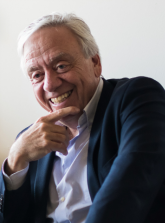
Year of Election
Division
Nationality
Country/Region of working/living
City
Institute
CV
2024
Medicine and Life Sciences Division
Belgian
Belgium
Brussels
Institute for Interdisciplinary Innovation in Healthcare
🏅2024 Blaise Pascal Medal in Medicine and Life Sciences
Michel Goldman, MD, PhD, is the Founding President of the Institute for Interdisciplinary Innovation in healthcare at the Université libre de Bruxelles. He currently serves as Editor-in-Chief of the journal Frontiers in Medicine and was the first Executive Director of the European Innovative Medicines Initiative from 2009 to 2014. He is a member of the Royal Academy of Medicine of Belgium and of the National Academy of Pharmacy in France. As an immunologist, his main scientific contributions have focused on the role of cytokines and T lymphocyte subpopulations in health and disease. He recently started working with economists on issues of drug innovation and access to medicines.
Michel Goldman is a laureate of the Lucien Steinberg Prize (shared with Pr. Peter Piot, 1997), of the Quinquennial Prize of the Belgian National Fund of Scientific Research (2000), and of the Spinoza chair at the University of Amsterdam (2001). In 2007, he was awarded the degree of Doctor Honoris Causa of the Université of Lille.
Major scientific achievements in the field of immunology
The pioneering experimental work of Michel Goldman in neonatal transplantation tolerance provided the first demonstration that T cells from newborns can develop immune responses biased towards the Th2 phenotype, leading to the production of pathogenic antibodies (1). Together with other models, these findings established Th2 cells as inducers of certain types of systemic autoimmunity (2). Later, Michel Goldman identified a deficient epigenetic remodeling of the gene encoding interleukin-12 in human antigen-presenting cells as the cause of the Th2 bias of neonatal immune responses (3), providing a molecular basis for the development of allergic disorders in early life. Michel Goldman also made the first demonstration that clonal Th2 cells can be responsible for the hypereosinophilic syndrome (4), a finding that paved the way for a new classification and targeted therapy of this human disorder (5). Furthermore, he demonstrated that alloreactive Th2 cells can cause chronic allograft rejection (6), a finding explaining hurdles to transplantation tolerance (7). Michel Goldman also pioneered experimental and clinical studies which established the key regulatory role of interleukin-10 in septic shock (8-10).
Key publications
(1) GOLDMAN M, FENG HM, ENGERS H, HOCHMANN A, LOUIS J, LAMBERT PH. Autoimmunity and immune complex disease after neonatal induction of transplantation tolerance in mice. Journal of Immunology 1983; 131:251-258. (58 citations)
(2) GOLDMAN M, DRUET P, GLEICHMANN E. A role for TH2 cells in systemic autoimmunity: insights from allogeneic diseases and chemically-induced autoimmunity. Immunology Today 1991; 12:223-227. (459 citations)
(3) GORIELY S, VAN LINT C, DADKHAH R, LIBIN M, DE WIT D, DEMONTE D, WILLEMS GOLDMAN M. A defect in nucleosome remodeling prevents IL-12(p35) gene transcription in neonatal
dendritic cells. Journal of Experimental Medicine 2004; 199: 1011-1016. (190 citations)
(4) COGAN E, SCHANDENE L, CRUSIAUX A, COCHAUX P, VELU T, GOLDMAN M. Clonal proliferation of type 2 helper T cells in a man with the hypereosinophilic syndrome. New England Journal of Medicine 1994; 330:535-538. (352 citations)
(5) ROUFOSSE F, COGAN E, GOLDMAN M. The hypereosinophilic syndrome revisited. Annual Review of Medicine 2003; 54:169-184. (178 citations)
(6) LE MOINE A, FLAMAND V, DEMOOR FX, NOEL JC, SURQUIN M, KISS R, NAHORI MA, PRETOLANI M, GOLDMAN M, ABRAMOWICZ D. Critical roles of IL-4, IL-5 and eosinophils in chronic skin allograft rejection. Journal of Clinical Investigation 1999; 103:1659-1667. (143 citations)
(7) LE MOINE A. GOLDMAN M. Non-classical pathways of cell-mediated allograft rejection: New challenges for tolerance induction. American Journal of Transplantation 2003; 3:101-106 (40 citations)
(8) GERARD C, BRUYNS C, MARCHANT A, ABRAMOWICZ D, VANDENABEELE P, DELVAUX A,
FIERS W, GOLDMAN M, VELU T. IL-10 reduces the release of TNF and prevents lethality in experimental endotoxemia. Journal of Experimental Medicine 1993; 177:547-550 (1034 citations)
(9) MARCHANT A, BRUYNS C, VANDENABEELE P, DUCARME M, GERARD C, DELVAUX A, DE
GROOTE D, ABRAMOWICZ D, VELU T, GOLDMAN M. IL-10 controls IFN-gamma and TNF production during experimental endotoxemia. European Journal of Immunology 1994; 24:1167-1171 (392 citations)
(10) MARCHANT A, DEVIERE J, BYL B, DE GROOT D, VINCENT JL, GOLDMAN M. Interleukin-10 production during septicaemia. The Lancet 1994; 343:707-708 (470 citations)
